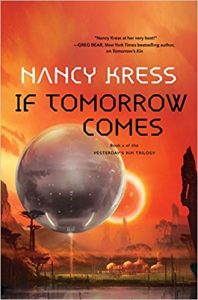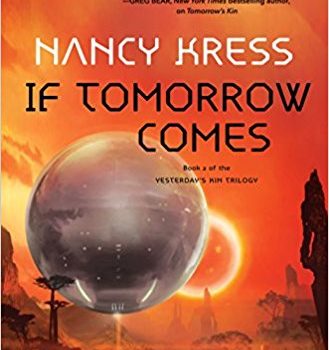Russell Letson Reviews If Tomorrow Comes by Nancy Kress
 If Tomorrow Comes, Nancy Kress (Tor 978-0-765390325, $27.99, 336 pp, hc) March 2018. Cover by Stephan Martiniere.
If Tomorrow Comes, Nancy Kress (Tor 978-0-765390325, $27.99, 336 pp, hc) March 2018. Cover by Stephan Martiniere.
Nancy Kress’s If Tomorrow Comes is, as the subtitle informs us, the middle volume of three, which some might take to indicate an absolute dependence on its predecessor, Tomorrow’s Kin (2017) or the novella of the same title that serves as the first book’s opening section – but such folk would be making a mistake. While this book grows out of the generating situation of Tomorrow’s Kin and includes one major character in the cast, it is a strikingly different story and quite satisfying on its own. (That doesn’t mean newcomers shouldn’t seek out the first entry anyway.)
Sufficient orienting material is supplied early on: that Earth has received a visit, a warning, and a request for help from the Kindred, the descendants of a group of Earth humans kidnapped by powerful and mysterious aliens and settled on an extrasolar planet some 140,000 years ago. In the intervening millennia, they have formed a peaceful culture and eventually gone star-traveling, and their visit brings the warning that a disease-bearing cloud of interstellar spores has already wiped out the population of their one colony planet and is now headed for both Earth and their own home, World. The help they need is to develop a vaccine that will save both planets. On leaving, they give Earth the plans to build its own starships capable of traveling to World – which Terrans now rather confusingly insist on calling “Kindred.” (I will try to keep the nomenclature straight hereafter, but I make no promises.)
This volume begins when the newly built and barely-understood Earth vessel Friendship leaves on a return visit, carrying diplomatic and scientific delegations, as well as perhaps more military personnel (including an elite Ranger squad) than one would think necessary for a mission to a civilization with no warfare and no armies. There are, to be sure, unanswered questions about the Kindred and their situation, such as why a starfaring society needed the help of Terrans to develop an anti-spore vaccine; why, once Friendship arrives in the Kindred home system, there is no sign of space travel and no communication from World; and why the Kindred never mentioned that the apparently brief voyage would be subject to Einsteinian time dilation, so that 14 years have elapsed since departure.
What was supposed to be a political-cultural-scientific exploratory mission turns into a more dire and dangerous survival scenario that also resets the relationship between Earth and Kindred humankind to the point that this second contact might as well be a first. The world of the Kindred proves to be anything but the high-tech powerhouse utopia expected, and the large Earth contingent finds itself reduced to a few (half of them soldiers), marooned with minimal resources, and confronted by a series of challenges, puzzles, obstacles, misapprehensions, and intra- and cross-cultural conflicts. One might characterize such a story line as one damn thing after another – but this is no ramshackle, episodic, arbitrary adventure, because every damn-thing is rooted in some stubborn, intractable, and probably predictable reality. There is, to be sure, an initial diabolus ex machina that sends the expedition sideways, but the rest of the problems arise from familiar problem-generators, from physics and virology to the cussedness of human nature, both Terran and Kindred.
The viewpoint characters from the Friendship are regular-Army sniper Leo Brodie (not a Ranger, a distinction that matters to him and his squadmates), expedition physician Salah Bourgiba, and geneticist (and carry-over character) Marianne Jenner, whose son Noah was among a handful of Terrans who chose to leave with the Kindred when they returned to World. Eventually we also see the situation through the eyes of 13-year-old Austin Rhinehart, taken from Earth to Kindred as a toddler. While Marianne and Salah are normative figures and voices of reason, I found Brodie and Austin the most compelling characters, outsiders with strained relationships to their putative social frameworks. Brodie in particular is an odd fish: a voluntary washout from Ranger training, nevertheless a fine soldier and a superb sniper, a blue-collar regular guy who manages to absorb and understand what’s going on around him better than some of his betters, and eventually a reluctant agent of change. Austin’s not-unusual adolescent angst is exacerbated by his sense that, while he loves World, as a transplant from Earth he “didn’t belong anywhere” and “would never be normal.” His restless need to find a place where he really does belong is both understandable and the source of all manner of trouble – and finally providential.
The story’s material problems – of survival, of what to do in the face of the oncoming spore infestations, of how to cope with being cut off from return to Earth – are tied up with even more basic psychological and cultural issues, which might be why I find the perceptions, attitudes, and actions of Brodie and Austin so compelling. What makes the novel go is that most ancient of problem-generators, human nature. As in her Beggars sequence, Kress seems to portray the management of material conditions as necessary but not sufficient for maintenance of society. The “basic ethical and organizational principle” of Kindred is bu^ka^tel, a word that
somehow combined law, rank, sharing, and maternal responsibility in a rich mixture impossible for the American mind to sort out. Rank neither trumped law nor was law; Kindred was not an oligarchy…. What was clear was that everyone, mothers and men and lahks [extended families], belonged first to World, as stewards of its ecology. All of that checked runaway consumption, even though the economic structure made room for capitalism as well as socialism. There was no government welfare, since a lahk was deeply responsible for everyone born into it.
Nevertheless, when circumstances get dire enough, even the Kindreds’ social bonds can start to break down. As one of the Terran transplants explains about the apparent utopian condition of World, “Humans aren’t naturally peaceful. We’re biologically hierarchical and territorial. Only abundance, a monoculture, and intense indoctrination kept us so peaceful for so long.”
If Tomorrow Comes combines the struggles to solve material problems with a familiar Kressian treatment of encounter – the dance of understanding and accommodation needed to cross the boundaries between “alien” cultures (see the Probability sequence) – along with a sharp eye for the internal politics and procedures of ordinary human organizations (her biotech thrillers). When the immediate problems on Kindred are resolved, there remain enough of the aforementioned unanswered questions to generate a third volume. Nevertheless, this second act is strong enough to stand on its own – and, as I keep noticing about Kress’s work, she never quite lets any set of serious problems get tied up with a bow. Whatever issues the final book in this sequence takes on, they’re not going to be More of the Same, even though they will certainly be rooted in our endless talent for messing up.
Russell Letson, Contributing Editor, is a not-quite-retired freelance writer living in St. Cloud, Minnesota. He has been loitering around the SF world since childhood and been writing about it since his long-ago grad school days. In between, he published a good bit of business-technology and music journalism. He is still working on a book about Hawaiian slack key guitar.
This review and more like it in the May 2018 issue of Locus.
 While you are here, please take a moment to support Locus with a one-time or recurring donation. We rely on reader donations to keep the magazine and site going, and would like to keep the site paywall free, but WE NEED YOUR FINANCIAL SUPPORT to continue quality coverage of the science fiction and fantasy field.
While you are here, please take a moment to support Locus with a one-time or recurring donation. We rely on reader donations to keep the magazine and site going, and would like to keep the site paywall free, but WE NEED YOUR FINANCIAL SUPPORT to continue quality coverage of the science fiction and fantasy field.








